PEOPLE EXPERIENCING PREJUDICE
Through the years I've witnessed the obstructive effect prejudice has rendered toward my sister, Wanda, who is albino. In spite of often being rejected because of her colouring, she earned a Master's degree in dietetics, founded her own business as a Kindermusic teacher, has a happy marriage, and has reared three successful children. Recently two books have awakened my curiosity about how prejudice arises, what the ramifications of prejudice are, and what can be done by individuals to curb prejudicial beliefs and the destructive acts they inspire.
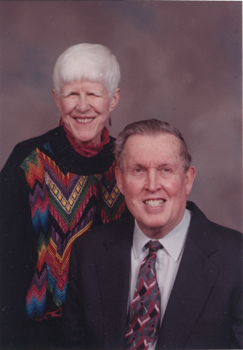
Wanda and Fred
The Reason You Walk, by Wab Kinew, tells his life story and the story of his father, Ndede, who as a young child was taken to a residential school in Canada to "kill the Indian in the child." As an Anishinaabe, Ndede was taught that humility, independence and dignity were the hallmarks of his culture, but at school and in the city he found that his people were referred to as dirty, dumb, drunk, and lazy. At the school Ndede was physically and sexually abused, saw his best friend beaten until he died of internal injuries. Some children were the subjects of experiments. They were fed prohibited food additives to measure the health consequences. They were denied dental care to measure the level of gum disease that would transpire. Wab Kinew wrote: "Perhaps his heart hardened. Maybe his spirit petrified. That is what little children did in order to survive residential school." Ndede hoped to be a boxer, but tuberculosis ended that dream. He married twice; the second wife is a non-native girl from the Beach area of Toronto and Wab's mother. Ndede worked as a mechanic, studied at St. Francis Xavier University and the University of Toronto, travelled and worked for First Nations causes. Franchise was not granted until 1960. While growing up Wab saw him as "...an angry, angry man." Before he died, Ndede wished to forgive those who had hurt the children of residential schools. He presented a feather to Pope Benedict XVI in 2009 as a symbol of reconciliation, and the pontiff accepted it as a signal of his willingness to embrace the indigenous culture. In 2012 Ndede participated in an adoption ceremony where he took the Archbishop as his kin.
Young Wab was sent to a private school in Winnipeg. As a teenager he "struggled to make sense of his indigenous identity." He was not sure how to fit into the rest of the country. Racism left "a bitter taste in my mouth," he wrote. At university "...sex, drugs, fights, and blackouts" were the norm. Upon graduation there were no jobs. Like his father he felt powerless to change the situations around him, which made him angry. He was arrested a few times and jailed for drunk driving and assault. He was released from jail under Ndede's care, and promised to join Alcoholics Anonymous and to resume the Sundance program. He married twice and has two sets of children. A letter he wrote to the Winnipeg Free Press about Canada's Olympic hockey team came to the attention of the CBC, and Wab was asked to do something on the radio. "Over a lifetime of internalizing the message that you are 'less than,' you start to believe some of the lies you hear about yourself. It lowers your sense of self-worth and influences your behaviours. You begin to censor your own thoughts and actions or make choices because of the way you expect to be perceived as an indigenous person." Wab wants his kids to see people like them as achievers. Here was a job that gave him a voice to discuss indigenous people.
Suicide is a leading cause of death for young indigenous people. Part of the problem stems from the residential school experience, which Wab had witnesses in his own family. His father had been punished for any sign of vulnerability, and he admonished his sons for signs of weakness. Without a sense of love between children and their parents, children turn to partying and violence. They feel disoriented; they do not know their own culture and cannot determine their own destinies. There is a lack of jobs. Those who clean floors and fillet fish are at least contributing to their families, but those few jobs offer limited prospects. Meaning comes through language, culture, work and a connection with the land. It also requires education, employment, and mental health services.
When his father was diagnosed with cancer, Wab left his job to spend time with his dad, to get to know his history, and to reconcile their differences. On the back cover of the book, next to his dad Wab's seen as a handsome man with cropped, dark curly hair, a wide smile and laughing eyes, and he wears a T-shirt imprinted with "Life is a beautiful struggle." (1)
Stalin's Daughter by Rosemary Sullivan is a biography of The Extraordinary and Tumultuous Life of Svetlana Alliluyeva, who was haunted by society's hatred toward her father. "Wherever I go, whether to Australia or some island, I will always be the political prisoner of my father's name," she said. Her mother committed suicide when Svetlana was only six, but she didn't learn the truth for years. Her aunt and two uncles were executed as enemies of the people; her childhood playmate disappeared, and at age seventeen, her first love was sent to the Gulag for a decade. Other close relatives were arrested and confined for years. After her father's death, the state still controlled her life and refused to let her marry Brajesh Singh, but after he died, they did allow her to carry his ashes back to India where impulsively she decided to defect. She intended to sell the life story she had written in the U.S. Her first asylum request was rejected, but when she finally arrived in the U.S. as a visitor, the government relented. Her son and daughter, left behind in Russia, never forgave her for abandoning them. Her memoir sold for $1.5 million, but she had no concept of managing money, gave much away and squandered the remainder. Still searching for love and security, she was manoeuvred into a marriage with Wesley Peters by Olgivanna Wright, the widow of Frank Lloyd Wright. They had a daughter, whom she cherished, but the marriage failed and life remained lonely and unsettling. She died penniless at the age of eighty-five a little more than two weeks after the anniversary of her mother's death seventy-nine years earlier. She had paradoxical feelings about her father who had treated her in loving ways as a child, but whose cruelty she had witnessed. She tried to understand his character, but only concluded that he was an unhappy man whose power did not satisfy his needs, and she kept repeating that he did not act alone. (2)
Lina Di Carlo sits in her wheelchair across the table from me in her living room. She's holding her book JUST WATCH ME! MY LIFE STORY as her Siamese cat checks me out and then jumps onto the top of the bookcase. The second cat, her fluffy grey cat, had scrambled out of sight when Lina opened the apartment door for me to enter. In 2013 she retired from being the Provincial Coordinator of Odyssey, a program establishing French and English Exchange studies under the auspices of the Council of Ministers of Education Canada (CMEC), a program she'd administered for 32.8 years. "I had the opportunity to retire from the job I loved." "As a girl growing up with polio in northern Italy, I never could have imagined that I would travel from British Columbia to Prince Edward Island and have such wonderful experiences." (3) Nor can readers of her memoir imagine how Lina's life unfolds.
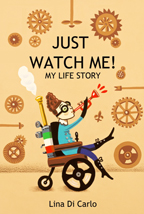 |
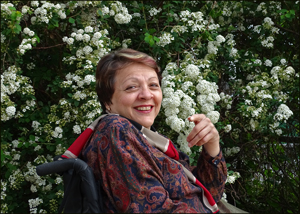 |
| Book cover, Just Watch Me! My Life Story (left) Lina Di Carlo at time of retirement (right) | |
She was born in October 1953, in a four-room house with an outhouse, constructed by her father out of rocks that rolled down the mountainside in rural Italy. Her father was an asphalt miner and part-time shepherd, tending a herd of sheep owned collectively. With five daughters in the family, likely it was hoped that she'd be a boy, but her father celebrated Lina's birth by immediately opening a bank account for her. When she was ten months old she contracted polio, which left her unable to walk. Relatives and friends carried her to all events when she was little and then her father pulled strings to get her a wheelchair. Even with community love and support she met with prejudice. When she was seven, her mother wheeled her to the first day of school, but the Principal figuratively threw up her arms. "We can't have her here. She'll fall over," but Lina's mother walked away. When she went to get Lina in the afternoon, she proclaimed, "We'll be back tomorrow!" People who didn't know Lina commented when they saw her in the chair, "How old is she? She must be thirty," but she was only seven. She overheard a woman lament, "It's better that God takes her. She is such a burden." Her family did not treat her as a burden and enabled her to cook and participate as her sisters did. Then, after her father visited one of the married daughters living in Canada, he decided that Canada offered more opportunities for Lina, and he engineered their immigration. At York University she earned a degree in French and Italian and she pursued a Master's degree at Laval University in Quebec City. Because of her language abilities, an arrangement was made for her to be interviewed for a job with an Italian newspaper, but when she arrived for the interview in a wheelchair, the employer informed her that the job had been filled. The title of her book shows her spirit. In the book you'll see pictures of her wedding, of trips she took abroad. She got a driver's license. And more importantly, she developed many friendships and spent years working at a responsible job she loved. Now she is fulfilling another dream. Her memoir has been translated into Italian and she believes that she can encourage others with disabilities to disregard prejudicial attitudes that hold them back.
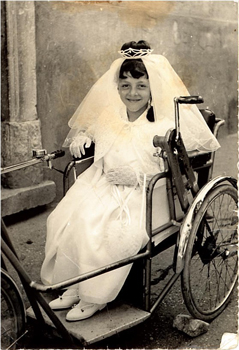 |
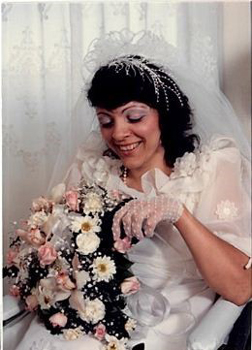 |
| Lina Di Carlo seated in wheelchair wearing christening gown (left) Lina Di Carlo in wedding dress (right) | |
ANSWERS TO MY QUESTIONS
How does prejudice arise, what are the ramifications of prejudice, and what can be done by individuals to curb prejudicial beliefs and the destructive acts they inspire?
SOME DEFINITIONS -
Prejudice is learned; it is not innate to human nature. This negative attitude toward a group, may lead to destructive, violent actions toward individuals of that group. We are by nature empathetic creatures. Babies on a ward will cry when a baby near them cries. (5)
bias is a mild negative or positive attitude toward a group.
stereotype refers to typical attitudes and actions attributed to the group.
bigotry refers to intense hatred toward a group.
free will is the ability of an individual to choose what actions to take and what to believe. (5)
human rights: In international and domestic laws dealing with human rights, every human is granted recognition and freedom to engage in the fullness of civic life without unjustified limitations, particularly those historically associated with ethnicity, race, spiritual outlooks, nationality, physical impairments, gender, and more recently sexual orientation.
discrimination is a function of protecting one's interests and may or may not derive from prejudice. E.g. If a person is trying out for a part in a play, he/she may find many discriminatory things to contend about why his/her competitor should not be chosen.
MAJOR CAUSES THAT LEAD TO PREJUDICE -
- 1) personal frustration builds until the person acts, often by blaming someone else for the situation and finding a scapegoat. (4) (5)
- 2) uncertainty about the person based on lack of knowledge or experience with the group to which that person belongs, or basing the attitude on the stereotypical view of the person's group. E.g. Some Canadians and Americans tend to stereotype all Arabs as Muslims, and since 9/11 Arabs have often been stereotyped as possible terrorists. (4) (5)
- 3) threat to one's self-esteem. E.g. Girls resent being called "fatty" or "chubby" because of their size and boys resent being called a "sissy" when they aren't good at sports. (4) (5)
- 4) competition among individuals to achieve status, wealth and power. At a boy's camp, campers were divided into teams to compete with each other in sports. The boys began to call boys on the competing team derogatory names and stopped being friends even with boys who shared their bunkhouse. When the groups were scheduled to work together requiring cooperation, the boys again made friendships. (4) (5)
Prejudice arises over many types of differences: ethnicity, race, religion, gender, sexual orientation, social class, education, physical abilities, appearance, wealth or its lack, history, for example.
Once people achieve power they tend to do anything they can to maintain power.
Studies show that when people are allowed to vent their anger against another person or group, it only intensified their hostility. E.g. Men who abuse their wives often plead "she kept nagging and wouldn't shut up." Abusers need to be taught non-violent strategies for managing anger. (5)
PREJUDICE - PERPETUATED THROUGH OUR LANGUAGE, MEDIA AND JOKES -
Bridges suggests that we list incidents showing how our language perpetuates prejudice. For example "white" in the English language implies positive patterns such as white wedding dress, white knight, whitecolour crime, whereas "black" implies negativity such as black-hearted, black knights, blackball, blacklist. (5)
Some English speaking people feel that using "he" and "she" perpetuates gender bias and wish to replace those words with "they."
How often are people with disabilities pictured in advertising?
How often are women pictured in ads that do not show them as sex objects?
In a movie when have you seen an Arab as the law enforcer rather than the possible terrorist?
Our jokes often belittle the country guy or the Asian mom who does not know modern ways. (5)
OVERCOMING PREJUDICIAL ATTITUDES, PREVENTING DISCRIMINATORY ACTS - Researchers have shown that "more knowledge about others helps people overcome stereotypic perceptions." (5) Schools must recruit diverse students and faculty and promote interactions through workshops, seminars, exchanges, and field-trips with diverse people in the community. Parents can introduce their kids to situations where people with varied backgrounds participate. Books and movies may show how others live. We can identify our prejudices, understand how we learned them, and not let them control us. The positive choices we make today will shape the world our children live in tomorrow. (5) (6)
ROBOTS, ANOTHER OPTION - John Horton Conway, the mathematician who invented surreal numbers and the Game of Life, suggests that robots will soon replace humans. They will be designed, eliminating aspects of humans which are destructive [such as the ability to form prejudicial attitudes] and "you would get creatures that really deserve the name 'living.'" (7)
CONCLUSION
People growing up in a loving environment, who become educated and have self-determination are frequently able to overcome obstacles of prejudice and live happy productive lives, but they are not guaranteed freedom from discrimination and prejudice. Prejudicial attitudes arise about a number of differences between humans because the targeted humans appear to be a threat to the perpetrator's well-being, often due to lack of knowledge about the other group. Prejudice is a destructive force often leading to bullying, violence, fights, etc. We must learn to recognize prejudice and curb its influence on our attitudes and actions in order to have a peaceful world. Knowledge has been demonstrated to deafen prejudice, so parents, teachers and childcare professionals should introduce children to people of varied cultures, and they should find ways for children to cooperate on projects with people of varied backgrounds. Schools and institutions dealing with children should employ people from diverse backgrounds and provide books, videos and other materials that teach children about people who differ from themselves. Laws can dictate that various groups are treated equally. Governments should protect the human rights of its citizens, just as each individual should recognize the rights of their neighbours. Jobs! Employers and governments should increase their efforts to create meaningful jobs for everyone who wishes to work. Must we wait for a world populated by robots to end the prevalence of prejudices?
REFERENCES:
- 1. Kinew, Wab. (2015), The Reason You Walk. Toronto, Canada: Viking an imprint of Penguin Canada Books Inc., a Penguin Random House Company.
- 2. Sullivan, Rosemary. (2015), Stalin's Daughter The Extraordinary and Tumultuous Life of Svetlana Alliluyeva. Toronto, Canada: HarperCollins Publishers Ltd.
- 3. Di Carlo, Lina. (2015), Just Watch Me! My Life Story. Toronto, Canada: Vitatua.
- 4. Levin, J. & Levin, W., (1982), The function of discrimination and prejudice. New York, N.Y.: Harper and Row.
- 5. Bridges, Harry. (2012). "Understanding Prejudice and Its Causes." Pearson Education (Chapter 2). https://catalogue.pearsoned.co.uk/assets/hip/gb/hip...013282492.pdf Retrieved March 14, 2016.
- 6. "Stereotypes and Prejudices." Holocaust history and stories from Holocaust Survivors, Liberators, Books and Art. http://remember.org/guide/history-root-stereotypes.htm Retrieved March 14, 2016.
- 7. Roberts, Siobhan. (2015), Genius At Play The Curious Mind of John Horton Conway. New York, N.Y.: Bloomsbury Publishing Plc



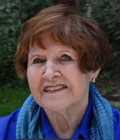 Marlene Ritchie
Marlene Ritchie










